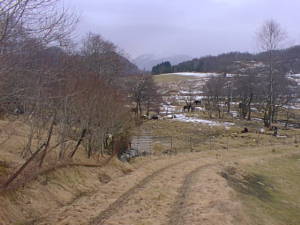Monday 16 July 2001

|
Pic of the day: Not exactly the road most travelled, this old farm road. (Photo from my trip to Norway's west coast early this spring.) Alas for the farmerI did not just grow up on a farm. No, I am a farmer born and bred, a son of farmers for generation upon generation, stretching back into the mists of history. Yet my later years surrounded by young urban people has taught me to see through their eyes too. The pictures are strikingly different. Once, most Norwegians were like me. Our country was not fully industrialized until around the middle of the 20th century. The people who sought to the industry were from farms, mostly younger sons who could not expect to inherit the land. But also elder brothers who found that they could earn more with less work. And of course, many farmers worked in the factory as well, having a small farm on the side. Often the wife did much of the farm work. So it was that most Norwegians had some connection to agriculture. Until recently, they had a grandfather or an uncle or a cousin out in the country. And this was where many Norwegians spent their summer vacation, back before we all got rich enough to take the plane to Spain or Thailand for a few weeks in the sun. I remember from my own childhood how relatives from far and near would come to the farm in summer. Especially those who had grown up on that farm, and their spouse and children. But the years pass, and become a generation. And with the new generation, the link is broken. The kids that used to spend their summer on the farm still remember it fondly, but they don't feel close enough to show up every summer with their own kids. Besides, there's the trip to Bali or Margarita. And so their children again grow up without petting calves (the cow kids I mean, not the legs) and without diving in the hay. Their loss, but more than that: The end of an era in Norwegian agricultural policy. ***Norway isn't quite as cold and desolate as it looks on the map. But neither is it ideal for most types of agriculture. The harsh truth is that most food can be imported cheaper than we can grow it ourselves. But we don't do that. Back when everyone had some friendly old relative on the farm, there was a general agreement that we should keep the many small farms, even if it meant more expensive food and outright gifts to the farmers from our tax money. After all, the farm was something more than just a food factory. It was an institution. And besides, you did not want to break Grandpa's heart. It is said that "you can tell the ideals of a nation by its advertisements". (Norman Douglas?) If so, our ideal must be cheap groceries ... And while the low-cost chains boast about making Norway cheaper, the farmers have been taking the brunt of the price cuts. And more is to come. To young people today, Norwegian agriculture is not about culture at all. They have a vague feeling that the farmers are taking their tax money, but know little more. Why have cows when we can buy milk at the supermarket? In the long run, it is possible that food prices on the world market will rise. Forecasts show that world population may grow to slightly above 10 billion. And every year in China alone, millions of people move from poverty to lower middle class, and then continue upward as best they can. These people don't just eat more. They eat "better", that means more meat. And meat requires more resources to make, and commands a higher price. It is possible that continued progress in agriculture will let supply keep up with demand. Certainly this has happened before. When I was a kid in the 1960es, it was widely believed that famine would decimate the developing world, particularly India. Today, famine is practically unknown except for countries in war or civil war. Yet there are clouds on the horizon: Soil erosion makes fertile land into desert, while conservation efforts may stop the clearing of rainforest for farming. So there may come a time, years from now, when food is expensive enough that we would like to grow our own again, even up here in Norway. Hopefully at least some farmers have managed to hang on that far. Because farming isn't quite like paper shuffling. It requires a different mindset, where you sway with the rhythm of nature rather than punch your card twice a day. Agriculture is indeed a culture, and it would be a shame if it was utterly lost. |
Sunny, not hot and not cold. |
Yesterday <-- This month --> Tomorrow?
One year ago
Two years ago